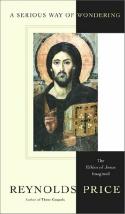Issue Date: October 10, 2003
Reviewed by RICH HEFFERN Reynolds Price is an award-winning novelist, a poet, essayist and professor of English at Duke University. In addition to his writing and teaching, Price has pursued a lifelong interest in ancient languages and biblical scholarship and has published several books about the New Testament accounts of Jesus. In his latest book he explores some of the moral implications of the gospels through a technique he calls “imagined narrative,” accounts of some meetings Jesus might have had both before and after his resurrection that the author hopes will shed light on Jesus’ ethical views on some controversial subjects. He justifies his technique with a quote from William Blake: “Imagin-ation is evidence of the divine.” The gospel accounts of Jesus’ acts and teaching do seem fragmentary and incomplete, especially after modern scholarship divides the authentic sayings and stories from those added on later. We would all like a more full-bodied biography. What’s more, the fundamentalists’ approach seems more interested in ferreting out the Leviticus-like nuggets of rigid law or applying the Pauline condemnations found in the New Testament than in following the spirit and responding to the scope of Jesus’ ethical teaching. Price asks if we can perhaps extrapolate from the portrait of Jesus we’re given by the evangelists to expand our notions of what Christianity means. What, indeed, would Jesus do? Price uses his novelist’s imagination to explore ethical situations that the canonical gospels, for whatever reason, miss. He digs into some moral dilemmas that have puzzled and divided Christians for centuries. The three questions addressed are these: homosexuality, suicide and the place of women in society and the church. To confront the first two questions, Price tells stories of Jesus’ encounters after his resurrection with Judas Iscariot. In the third story, Jesus dialogues with the woman caught in adultery, whom Price calls Rahab. In the end, Price’s speculations present Jesus viewed from a slightly different angle than that to which we’re accustomed. It’s a deeply thoughtful, human Jesus, who is both mindful of and puzzled by his own unique nature and thereby aching with a bewildered compassion for his fellows, especially the sinners and outcasts. Price suggests that God the Father chose to sacrifice his Son and then glorify him with resurrection “simply to disprove his Son’s unstable misunderstanding of the completeness of God’s love.” Eager to find the essential truth of Jesus’ message to us, Price notes that the gospel accounts of Jesus’ post-resurrection “life” are lean and sparse. He reminds us also that both scripture and tradition indicate Jesus probably spent those hours between death and rising visiting the souls of the departed and learning from what he experienced. Price draws this conclusion: Whatever he learned in the hours of darkness, the ethical bareness of Jesus’ resurrection sayings seems to me to establish beyond doubt that he’d at last come to see that the only Law with binding force upon us is the Law of Grace. And grace is enlightenment, the strength and -- often more revealingly, though terribly -- the trials which God sends us in hope that we’ll more adequately rise to the work of loving our neighbors, ourselves, the remainder of creation and Himself. Reynolds Price has given us a poignant, even heart-rending new portrait of Jesus the ethical teacher, one that could serve to renew our resolve to find a way through the toughest moral mazes of our time. Rich Heffern is a frequent contributor to NCR. National Catholic Reporter, October 10, 2003 |
